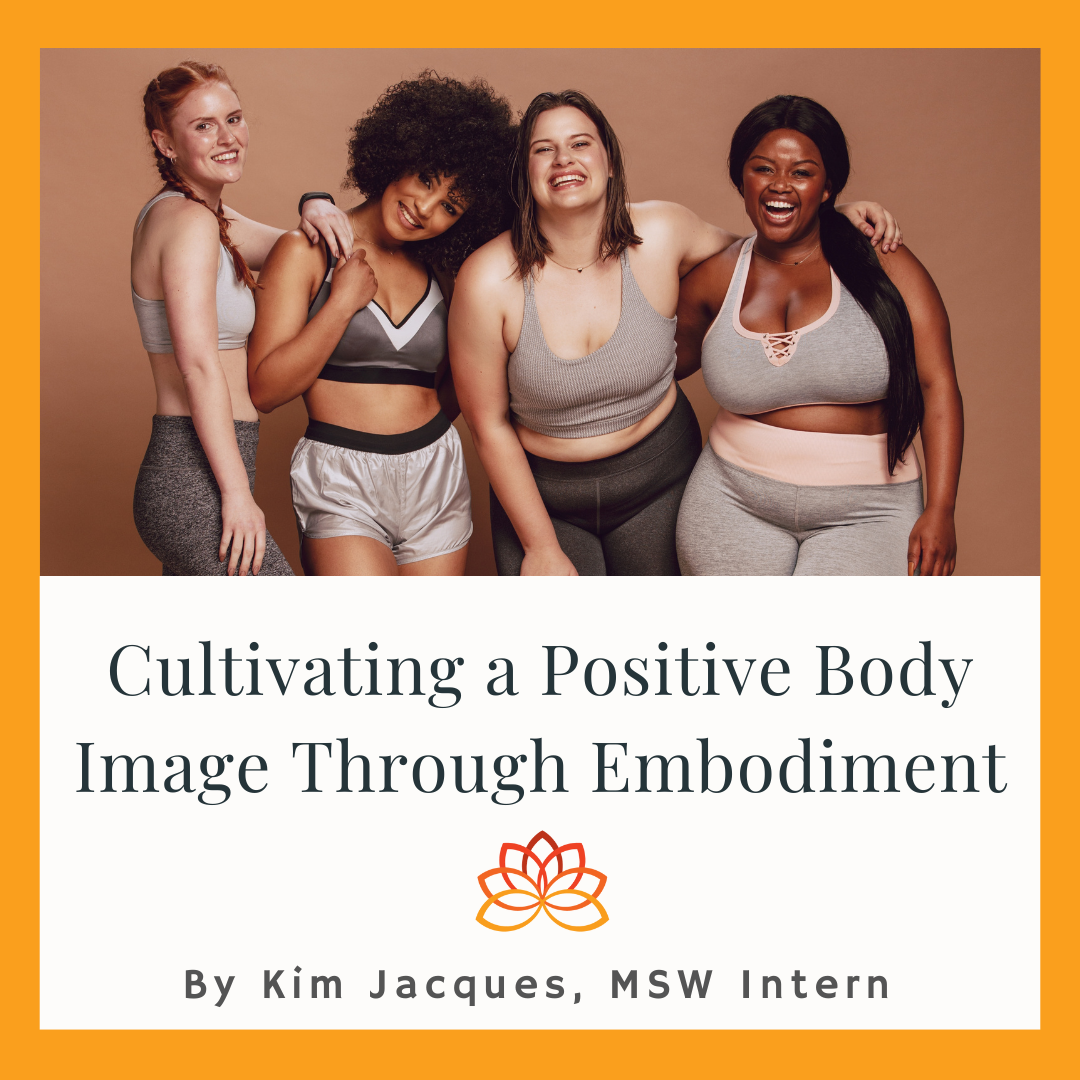Cultivating a Positive Body Image Through Embodiment
By Kim Jacques, MSW Intern
In a world where images of idealized bodies flood our social media feeds, the struggle with body image and self-objectification has become a common experience. Many people find themselves trapped in a cycle of comparing their bodies to these often unattainable standards, leading to feelings of inadequacy and dissatisfaction. However, there is a growing movement toward embodiment—a concept that encourages a deeper, more holistic connection with our bodies. Let’s explore the differences between self-objectification and embodiment and how embracing the latter can transform our relationship with ourselves.
Understanding Self-Objectification
Self-objectification occurs when individuals internalize the idea that their worth is largely based on their appearance. This mindset is heavily influenced by societal pressures, media portrayals, and cultural norms that prioritize physical appearance over intrinsic qualities. When people engage in self-objectification, they tend to view themselves through a critical lens, focusing on how they look rather than how they feel or what they can do.
This constant scrutiny can lead to various negative outcomes, including anxiety, depression, and disordered eating. Moreover, self-objectification can hinder genuine connections with others, as it shifts the focus from authentic interactions to superficial evaluations based on appearance.
The Power of Embodiment
In contrast, embodiment is about embracing our bodies as integral parts of our identity, focusing on the experiences, sensations, and emotions that arise from being in our bodies. It encourages us to shift our attention from how we look to how we feel, allowing us to appreciate our physicality in a more profound and meaningful way.
Embodying oneself means celebrating our bodies for their capabilities and unique characteristics, rather than measuring them against societal ideals. It involves mindfulness practices, self-compassion, and a commitment to nurturing our physical and emotional well-being.
Stillpoint Counseling and Wellness therapist Spencer Lee, LCSW says that body objectification is like focusing solely on the appearance of your home—fixating on how it looks from the outside, what others think, and whether it meets certain standards. This can lead to constant worry and dissatisfaction, much like when we criticize our bodies based on unrealistic ideals. In contrast, embodiment is akin to enjoying the warmth and comfort of living in that home, appreciating the memories created within its walls and the feelings of safety and joy it brings. It’s about valuing the experience of being in the space rather than just how it appears to others, allowing for a deeper connection and appreciation for what truly matters.
Strategies to Foster Embodiment
1. Mindful Movement: Engage in activities that promote a connection with your body, such as yoga, dance, or even walking in nature. Focus on how your body feels during these movements rather than how it looks. This practice can help cultivate body awareness and appreciation.
2. Gratitude Journaling: Start a daily practice of writing down things you appreciate about your body—whether it’s your strength, agility, or the way it allows you to experience life. This shift in focus can help rewire your relationship with your body.
3. Limit Social Media Consumption: Be mindful of the content you consume online. Curate your feed to include accounts that promote body positivity and diversity. Reducing exposure to idealized images can decrease feelings of inadequacy and comparison.
4. Practice Self-Compassion: Treat yourself with the same kindness and understanding that you would offer a friend. Recognize that everyone has insecurities and that your worth is not defined by your appearance.
5. Engage in Community: Surround yourself with supportive individuals who celebrate body diversity and authenticity. Sharing experiences and encouraging one another can create a sense of belonging and reduce feelings of isolation.
In Conclusion
Navigating body image in today’s world can be challenging, but by understanding the detrimental effects of self-objectification and embracing the practice of embodiment, we can cultivate a healthier relationship with ourselves. By focusing on how we feel in our bodies rather than how we appear, we can break free from societal constraints and celebrate our uniqueness. Ultimately, embodying ourselves is about recognizing that we are more than our appearances—we are vibrant, capable beings worthy of love and acceptance just as we are. Embrace the journey of embodiment, and watch as your perception of self transforms.
Spencer Lee, LCSW loves to help people overcome anxiety and become more confident in themselves. From interning with the domestic violence shelter, Spencer has developed a passion for helping women find happiness and health in their relationships. She also enjoys helping others find peace with their body-image. Spencer is trained in person-centered therapy, narrative therapy, and CBT. She also uses solution-focused brief therapy, solution-oriented therapy, and motivational interviewingIn her free time, Spencer enjoys going to the beach, playing tennis and pickleball, and buying new toys for her cats
